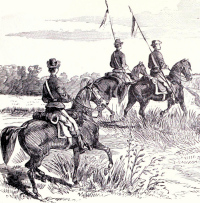Camp Zagonyi, October 14th. We were in the saddle this morning at nine o’clock. A short march of eleven miles, in a south-westerly direction, and through a prairie country, brought us to our camp. As we came upon the summit of a hill which lies to the west of our present position, our attention was directed to a group standing in front of a house about a mile distant. We had hardly caught sight of them when half a dozen men and three women mounted their horses and started at full speed towards the northeast, each man leading a horse. The General ordered some of the body-guard to pursue and try to stop the fugitives. We eagerly watched the chase. A narrow valley separated us from the elevation upon which the farm-house stood, and a small stream with low banks ran through the bottom of the valley. The pursuit was active, the guardsmen ran their horses down the slope, leaped the pool, and rushed up the opposite hill but the runaways were on fresh horses, and had no rough ground to pass, and so they escaped. One of them lost the horse he was leading, and it was caught by a guardsman. This was the first exhibition we have seen of a desire on the part of the inhabitants to avoid us.
The General established headquarters alongside the house where we first discovered the Rebel party. Our position is the most beautiful one we have yet found. To the west stretches an undulating prairie, separated from us by a valley, into which our camping-ground subsides with a mild declivity; to the north is a range of low hills, their round sides unbroken by shrub or tree while to the south stretches an extensive tract of low land, densely covered with timber, and resplendent with the colors of autumn.
Before dark the whole of Asboth’s division came up and encamped on the slopes to the west and north: not less than seven thousand men are here. This evening the scene is beautiful. I sit in the door of my lodge, and as far as the eye can reach the prairie is dotted with tents, the dark forms of men and horses, the huge white-topped wagons,–and a thousand fires gleam through the faint moonlight. Our band is playing near the General’s quarters, its strains are echoed by a score of regimental bands, and their music is mingled with the numberless noises of camp, the hum of voices, the laughter from the groups around the fires, the clatter of hoofs as some rider hurries to the General, the distant challenges of the sentries, the neighing of horses, the hoarse bellowing of the mules, and the clinking of the cavalry anvils. This, at last, is the romance of war. How soon will our ears be saluted by sterner music?
Fremont’s Hundred Days in Missouri was published in three installments in The Atlantic Monthly. The anonymous author appears to have been a member of Fremont’s staff with a disdainful bias towards Missourians, even those who were pro-Union.
